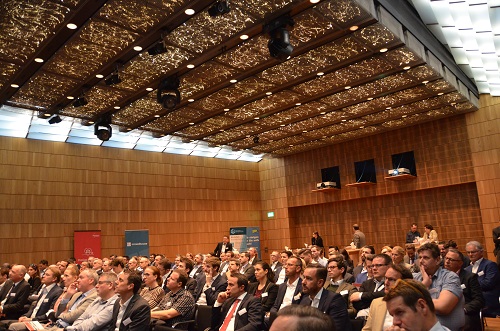Review 75th Swiss Real Estate Talk: "Crowdinvesting and Blockchain instead of real estate funds?"
The most recent Real Estate Talk at the end of February dealt with the topic "Crowdinvesting and Blockchain instead of real estate funds? - How the investment universe is changing for private investors". Representatives from both sides as well as a proven expert in the field of real estate investment law spoke and discussed.

Funds are very popular as an asset class that also gives private investors access to real estate as a capital investment. In recent years, investment opportunities have emerged with crowdfunding platforms that aim to appeal to retail investors, among others. In addition, the first attempts are being made in the industry to establish blockchain-based vehicles. However, there are still many question marks regarding security, regulation and government support, as moderator Prof. Dr. Markus Schmidiger from the IFZ Institute for Financial Services Zug noted at the beginning of the very well-attended 75th Swiss Real Estate Talk at the Metropol restaurant in Zurich.
From the co-ownership model to the "real estate ecosystem
For Zef Gjeloshi, Managing Director Real Estate Acquisition & Investment Management at Crowdhouse, Zurich, crowdfunding is the trend of the times. Founded just under four years ago, more than 100 properties with a transaction volume of CHF 680 million have now been financed via the platform. From Gjeloshi's point of view, Crowdhouse's co-ownership model "makes it easier than ever before to become the registered owner of investment properties in the land register." The envisaged next development steps are to develop Crowdhouse into a complete "digital real estate ecosystem," which Gjeloshi counts among other things the already established sales platform for the secondary market, through which 20 real estate transactions have now been processed.
Vision of blockchain transactions without intermediaries
Brigitte Luginbühl, CEO of Crypto Real Estate AG (CREAG) in Zug, spoke about her company's goals of one day being able to trade and transfer real estate assets using blockchain and completely without intermediaries such as brokers or banks. Settlement via a "decentralized shared database" is "much more than just the digital display of assets." Countering fears that blockchain and cryptocurrencies could be used for money laundering or other illegal activities, Luginbühl said, "The technology is not there to circumvent sets of rules." For her, the advantages of the blockchain- and token-based real estate deals envisioned by CREAG lie in low transaction costs, more liquidity on the secondary market, and smaller lot sizes per investment, which would thus also be open to any private investor - and her company wants to provide the necessary technology for this.
"The regulated fund industry offers security"
Urs Fäs, Managing Director, Head Investment Products, Real Estate - Switzerland at UBS Asset Management, began by talking about the long history of Swiss real estate funds, which dates back to 1943 - an asset class that impresses with "consistent returns over the long term despite fluctuating real estate prices". It is a very liquid market, with a monthly trading volume of more than CHF 500 million. For Fäs, real estate funds score with the transparency of the regulated asset class, with consistent rental income or a steady cash flow - investors can expect regular distributions. Also important is the legal right to redeem fund units, which creates additional security for investors.
Pros & Cons - Crowdinvestments and Blockchain
Particularly when it comes to security, attorney Andreas F. Vögeli, partner at the Zurich law firm Niederer Kraft Frey, sees the differences between the fund and crowdinvest sectors. The legal classification of crowdinvest vehicles is quite different, he says, while real estate funds have been subjected to strong and tight regulations over time - especially in terms of investor protection. In the case of the current and still comparatively young crowdinvestments, on the other hand, much depends on the precise "qualification of the contractual relationships between the participants". Here, for example, the crowdinvest platforms are granted extensive powers of attorney, which often leads to double or multiple representations. In addition, there is hardly any co-determination in the contractual documents and some providers are also suspected of "unfair promises of returns". With regard to blockchain, Vögeli cited the examples of some countries that have digitized and secured their land registers using the new technology.
Watch the video of the event here
Presentations:
Zef Gjeloshi - Crowdhouse Presentation
Andreas F. Voegeli - Niederer Kraft Frey
Brigitte Luginbühl - Crypto Real Estate
Once again, the 75th Swiss Real Estate Conference was very well attended at the Metropol in Zurich (Photos: Thomas Herren)



























